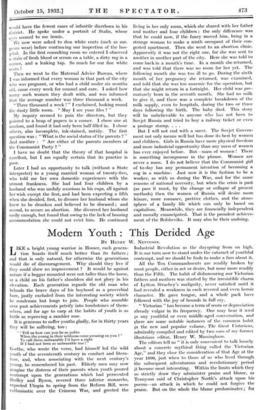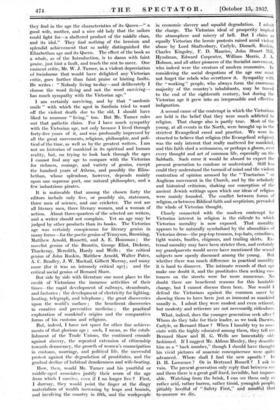Modern Youth : This Derided Age
BY HENRY W. NEVINSON.
LIKE a bright young warrior in Homer, each genera- tion boasts itself much better than its fathers ; and that is only natural, for otherwise the generations would die of discouragement. Why should they live if they could show no improvement ? It would be against nature if a beggar mounted were not taller than the horse, or a child on his father's shoulders did not glory in his elevation. Each generation regards the old man who belauds the brave days of his boyhood as a proverbial bore, justly excluded from the interesting society Which he condemns but longs to join. People who mumble over past achievements petrify into tombstones of them- selves, and for age to carp at the habits of youth is as futile as reproving a rambler rose.
It is generous to suffer youths gladly, for in thirty years they will be suffering, too : " Tell us how can you be so polite
When the young in their wildness come pressing on you ! ' To call them unbearable I'd have a right If I had not been so unbearable too !
Goethe, who wrote the verse, had himself led the wild Youth of the seventeenth century in conduct and litera- ture, and, when associating with the next century's young, he remembered his past. Elderly men may now imagine the distress of their parents when youth poured contempt upon the generations which had persecuted Shelley and Byron, revered three inferior monarchs, expected Utopia to spring from the Reform Bill, were enthusiastic over the Crimean War, • and greeted the Industrial Revolution as the dayspring from on high. It is our turn now to stand under the cataract of youthful contempt, and we should be fools to make a fuss about it.
All the Ten Commandments are readily broken by most people, either in act or desire, but none more readily than the Fifth. The habit of dishonouring our Victorian fathers and mothers was started by the irresistible charm of Lytton Strachey's malignity, never satisfied until it had revealed a weakness in each revered and even heroic character. He gave tongue, and a whole pack have followed with the joy of hounds in full cry.
" Victorian " has become a term of scorn or depreciation already vulgar in its frequency. One may hear it used in any youthful or even middle-aged conversation, and there are some notable instances of the common habit in the new and popular volume, The Great Victorians, admirably compiled and edited by two sons of my former illustrious editor, Henry W. Massingham.
The editors tell us " it is only convenient to talk loosely about a concrete mythical thing called the Victorian Age," and they close the consideration of that Age at the year 1890, just when to those of us who lived through the subsequent adventurous and revolutionary period it became most interesting. Within the limits which they so strictly draw they administer praise and blame, as Tennyson said of Christopher North's attack upon his poems—an attack in which he could not forgive the praise. But on the whole the blame predominates ; for they find in the age the characteristics of its Queen—" a good- wife, mother, and a nice old lady that the sailors could fight for—a sheltered product of the middle class, and its idol." They find nothing of the heroism and splendid achievement that so nobly distinguished the Elizabethan age and its Queen. The effect of the book as a whole, as of the Introduction, is to damn with faint praise, just hint a fault, and teach the rest to sneer. One eminent critic, Mr. W. J.-Turner, in a violent depreciation of Swinburne that would have delighted any Victorian critic, _goes further than faint .praise or hinting faults.
He writes : " Nobody living to-day—and deliberately I choose the word living and not the word surviving— has much sympathy with the Victorian age."
I am certainly surviving, and by that " sardonic smile " with which the aged in Sardinia tried to ward off the violent death due to the old, I should have liked to murmur " living," too. But Mr. Turner rules. out that pathetic claim. For I have much sympathy with the Victorian age, not only because I lived through forty-five years of it, and was profoundly impressed by all the great movements, religious, philosophic, and poli- tical of the time, as well as by the greatest writers. I am not an historian of mankind in its spiritual and human reality, but, on trying to look back through the ages I cannot find any age to compare with the Victorian for richness, courage, and variety of genius, except the hundred years of Athens, and possibly the Eliza- bethan, whose splendour, however, depends mainly upon one supreme poet, one natural philosopher, and a few industrious .pirates. .
• It is noticeable that among the chosen forty the editors include only five, or possibly six, statesmen, three men of science, and one cricketer. The rest are all literary men, three literary women, and a woman of action. About three-quarters of the selected are writers, and a writer should not complain. Yet an age may be judged by other products than, its books. The Victorian age was certainly conspicuous for literary genius in many forms—for the poetic genius of Tennyson, Browning, Matthew Arnold, Rossetti, and A. E. Housman ; the novelist genius of the Brontes, George Eliot, Dickens, Thackeray, Meredith, Hardy and Wells ; the critical genius of John Ruskin, Matthew Arnold, Walter Pater, A. C. Bradley,.T. W. Mackail, Gilbert Murray,. and many more (for it was an intensely critical , age) ; - and the critical social genitis of Bernard Shaw.
But side by side with literature one must place to the credit of Victorians the immense activities of their times—the rapid 'development of. railways, steambOats, and factories ; the development. of electricity for lighting, heating, telegraph, and telephone ; the great discoveries Upon the world's. surface ; the be- neficent discoveries in curative and preventive medicine ; the practical exploration of mankind's origins and the comparativ=e, forms of his customs 'and religions. - But, indeed, I have not spnce. for other fine achieve- ments of that glorious age ; such, I mean, as the estab- lishment of the Trade Unions, the continued crusade against slavery, the -repeated extension of 'citizenship towards democracy, the groWth of women's emancipation in customs, marriage, and political life, 'the successful protest against the degradation of prostitutes, and the gradual decline of habitual drunkenness and Wife-beating. How, then, would Mr. Turner and his youthful or middle-aged associates justify their scorn of the age from which I survive, even if I no longer live ? First, I daresay, they would point the finger at the dingy materialism of wealth increasing. by" leaps and bounds, and involving the country in filth, and the workpeople- in economic slavery and squalid degradation.: I admit the charge. The Victorian ideal of prosperity implied the atmosphere and misery of hell. But I claim as equally Victorian the heroic protests raised amid violent abuse by Lord Shaftesbury, Carlyle, Disraeli, Ruskin, Charles Kingsley, F. D. Maurice, John Stuart Mill, Hyndman, Edward Carpenter, William Morris, .J. A.. Hobson, and all other.pioneers of the Socialist movement, who indeed were the creators of modern economics. In. considering the social despotism of the age one must not forget the rebels who overthrew it. Sympathy with the " working" people, who always form ...the. enormous majority of the country's inhabitants; may - be traced to the. end of the eighteenth century,.. but during the Victorian age it grew into an irrepressible and effective indignation.
A second cause of the contempt in which the Victorians are held is the belief that they were much addicted to religion. That charge also is partly true. Most of the young, at all events in the North, were brought up in the strictest Evangelical creed and practice. We were in- structed to believe that religion (the-Evangelical religion) was -the only interest that really mattered for mankind, and this faith shed a seriousness, or perhaps a gloom, over every thought and act of common life, especially on the Sabbath. Such error it would be absurd to expect the present generation to condone or understand. Still less could they understand the turmoil of mind and the violent contention of opinion aroused by- the ." Tractarian " or Anglican movement in the Church, and by the scholarly and historical criticism, shaking our conception of the ancient Jewish writings npon which our ideas of religion were mainly founded. The conflict between forms of religion, or between Biblical faith and scepticism, pervaded the whole of Victorian thought.
Closely connected with the modern contempt for Victorian interest in religion is the ridieule -to which Victorian morality is now exposed. That morality appears to be naturally symbolized by the absurdities of ' Victorian dress—the peg-top trousers, top-hats, crinolines, tight waists, bustles, Chignons, and trailing skirts. Ex- ternal morality may have been stricter then, and certainly- my grandparents would never have mentioned' the sexual subjects now openly discussed among the young. . But whether.there was much difference in practical morality- it is hard to discover. The. intimate records of that age make one doubt it, and the prostitutes then seeking cus- tomers on the streets were far more numerous. No doubt there are beneficent reasons for .this laudable change, but I cannot discuss them here._ Nor would I defend the .-.Victorians against . the common sneer by showing them to have been just as immoral as mankind usually is. . I. admit they were modest and even reticent, but modesty and reticence are not necessarily:ridiculous. ..What, indeed, does the younger generation seek. after ? Whom do they take for their. leader, as we took Darwin, Carlyle, or_Bernard Shaw ? When I humbly try to asso- ciate with the highly educated among them, they- tell me Bernard Shaw and H. G. Wells are lamentably old- fashiOned. If I suggest Mr.- Aldous Huxley, they describe him as a " back number," though I should have thought his vivid pictures of anae_ mic concupiscence were .quite advanced. Where shall I . find the . new- apostle ? In D. H. Lawrence ? • Or in Bertrand Russell ? I ask in vain.. The present generation only reply that- between me and them therein a, great gulf fixed, invisible, but impass- able. Watching from the brink, I can see them only as rather arid, rather barren, rather timid, youngish people, Pitiably heedful of ." Safety First," and mindful that to-morrow we die.



























































 Previous page
Previous page